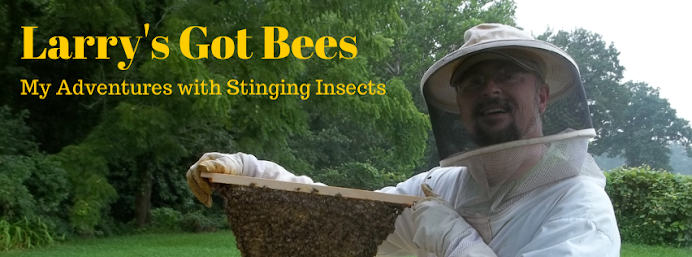On March 6, 2010, I attended the Audubon Beekeeping School sponsored by the Audubon Beekeepers Association. The following are some tidbits from my notes that day.
Keynote Speaker: Kent Williams
Theme: Beekeeper or Bee-Haver
Below is a video link of his 2007 presentation on First Year Beekeeping.
http://video.google.com/videoplay?docid=-1962032423026292861#
Next post will be on my notes from Introduction to Beekeeping by Robin Mountain, whose family had 4,000 hives in South Africa.
Keynote Speaker: Kent Williams
Theme: Beekeeper or Bee-Haver
- If you are going to be a beekeeper and not just someone who is a bee-haver, then you have to focus on sustaining your bee population because bees die.
- You can count on having a 20-30% beehive loss each year.
- To sustain your beekeeping operation you have to learn how to produce multiple hives from one hive, so as to replace the losses.
- The most important thing about getting started in beekeeping is to GET STARTED. Don't worry about buying the best bees, just get some bees.
- Year One Goal: Keep your bees alive.
- Year Two Goal: Know how to make more hives by splitting swarms.
- Have a Nuc box ready for each hive, so when it wants to swarm to can split the hive, not lose the bees, and expand your operation.
- When a hive swarms, the old queen will leave taking half the hive with her, leaving the the new virgin queen behind.
- The best time to split a hive is in the spring.
- If you build your operation to start raising queens, do so in a chemical free queen yard.
- Be sure and frequently watch your hive entrance for bee traffic; if traffic is low check out what the problem is.
- Don't check your hives too often, because every time you go into the hive the bees lose a day of productivity because they have to fix what you messed up by disturbing them.
- Check inside your hives at least 4 times a year but no more than twice a month unless you have a major problem.
- Don't be in your hive more than 20 minutes.
- Don't go looking for the queen, look for the evidence of her working (look for eggs and larva).
- When you add your bees to the hive the first time, be sure an close the entrance to the hive before dumping in the bees. Use grass to block the entrance, so if you forget to remove it, they can work it out themselves.
- Keep your hives at least 5 foot apart.
Below is a video link of his 2007 presentation on First Year Beekeeping.
http://video.google.com/videoplay?docid=-1962032423026292861#
Next post will be on my notes from Introduction to Beekeeping by Robin Mountain, whose family had 4,000 hives in South Africa.



No comments:
Post a Comment